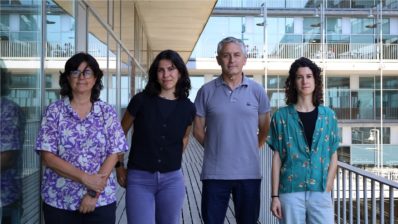Here’s your one-minute digest to some of this week’s research highlights of the centres at the Biomedical Research Park of Barcelona (PRBB). You can read the whole stories on the links provided, and if you want to dig even deeper, you can find the original research papers below.
Social personality and neuropathic pain
Different types of personality, such as sociability, anxiety or depression influence in the manifestations of neuropathic pain in mice (1), according to a new study by the NeuroPhar Lab at the Universitat Pompeu Fabra (UPF). It’s important to identify the factors involved in the severity of the neuropathic pain manifestations, in order to adapt the treatment to each patient.
Responsible Research and Innovation (RRI)
Public organisms, research institutes and companies need to improve the social integration of research and innovation. However, it’s difficult to decide what mesures we should take to improve the RRI. For that reason, the European Project SUPER_MoRRI started in January, in order to develop a better understanding of the relationship between policy and RRI. The Science, Communication and Society Studies Center at the Universitat Pompeu Fabra (SCS-UPF) participates in the project.
Chemical substances and lung function in children
A study codirected by the Barcelona Institute for Global Health (ISGlobal) concludes that early life exposure to different chemicals is associated with reduced lung function in children (2). Preventive measures to reduce exposure to the chemical substances identified, including a stricter regulation and the labelling of consumer products to better inform the public, could help prevent lung function impairment in childhood and benefit health in the long-term.
Citizen science on health in urban environments
The European project CitieS-Health, coordinated by the Barcelona Institute for Global Health (ISGlobal), is aimed at placing the environmental concerns of citizens at the heart of the research agenda. The city of Barcelona will host one of the five pilot studies of the project and the study is focused on the interrelation between air pollution and health.
Neurodegenerative diseases
A new study lead by researchers at the Centre for Genomic Regulation (CRG) reveals RNAs, which are crucial for cells to produce proteins, are also involved in protein aggregation (3), where proteins do not fold properly and ‘clump’ together into aggregates. Many neurodegenerative diseases are linked to protein aggregation, including Amyotrophic Lateral Sclerosis (ALS) and Alzheimer’s disease. It was known that proteins can form toxic aggregates, but until now, the contribution of nucleic acid molecules such as RNA has been up for debate.
Microbiota and addiction
A study promoted by the Institut Hospital del Mar d’Investigacions Mèdiques (IMIM) is aimed at modulating the gut microbiota to interfere in addictive behaviors. The gut and the brain communicate with each other through the gut-brain axis, in which microbiota plays a critical role. Some studies showed alcoholism and cocaine addiction induce changes in the composition of the gut microbiota. Other studies suggest that the gut microbiota could interfere in the development of some addiction behaviors.
(1) M. Martínez-Navarro, I.M. Lara-Mayorga, R. Negrete, W. Bilecki, A. Wawrzczak-Bargieła, L. Gonçalves, A.H. Dickenson, R. Przewłocki, J.E. Baños, R. Maldonado. Influence of behavioral traits in the inter-individual variability of nociceptive, emotional and cognitive manifestations of neuropathic pain. Neuropharmacology, January 2019. doi: 10.1016/j.neuropharm.2019.01.012.
(2) Lydiane Agier, Xavier Basagaña, Lea Maitre, Berit Granum, Philippa K Bird, Maribel Casas, Bente Oftedal, John Wright, Sandra Andrusaityte, Montserrat de Castro, Enrique Cequier, Leda Chatzi, David Donaire-Gonzalez, Regina Grazuleviciene, Line S Haug, Amrit K Sakhi, Vasiliki Leventakou, Rosemary McEachan, Mark Nieuwenhuijsen, Inga Petraviciene, Oliver Robinson, Theano Roumeliotaki, Jordi Sunyer, Ibon Tamayo-Uria, Cathrine Thomsen, Jose Urquiza, Antonia Valentin, Rémy Slama, Martine Vrijheid*, Valérie Siroux* *Contributed equally. Early-life exposome and lung function in children in Europe: an analysis of data from the longitudinal, population-based HELIX cohort. The Lancet Planetary Health. February 5, 2019. 10.1016/S2542-5196(19)30010-5.
(3) Research in this press release is based on findings published in the following academic paper:
Cid-Samper, F., Gelabert-Baldrich, M., Lang, B., Lorenzo-Gotor, N., Delli Ponti, R., Severijnen, L-A., Bolognesi, B., Gelpi, E., Hukema, RK., Botta-Orfila, T., Gaetano Tartaglia, G (2018). An Integrative Study of Protein-RNA Condensates Identifies Scaffolding RNAs and Reveals Players in Fragile X-Associated Tremor/Ataxia Syndrome. Cell Reports 25, 3422–3434. https://doi.org/10.1016/j.celrep.2018.11.076






